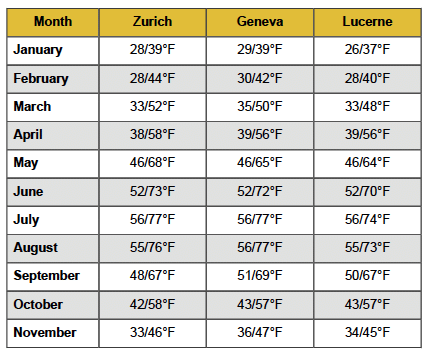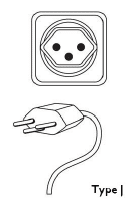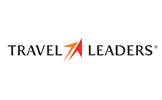SWITZERLAND

Fun Facts From Globus Tours
- In Switzerland, a new president is elected every year, while seven members of the Swiss Federal Council (Executive branch) are elected every four years. Switzerland is the first and only country to implement a people’s rights system of government—also called direct democracy—involving the constitutional initiative (public petitions) and referendum.
- Switzerland ranks among the top 10 in the world for highest life expectancy.
- The International Committee of the Red Cross (ICRC) was founded in 1863 in Geneva, and it is still based there.
Switzerland is a small treasure hidden amongst the Alps with idyllic, peaceful mountain scenery, breathtaking panoramas, unspoilt lakes, dark wooden chalets bedecked with flowers, the relaxing sound of cow bells, a warm atmosphere of friendship around a cheese fondue, spotless ski runs, and picturesque, friendly towns, including the capital Bern, Lucerne, Zermatt, and Lugano.
Who could imagine such a variety of attractions, ways of life, culture, and traditions in such a small country? One-tenth the size of California with a population of eight and a half million, Switzerland is also an economic miracle. Because 70% of its territory is covered by mountains with no raw materials (except water, which besides providing magnificent scenery with glaciers, rivers, and nearly 1500 lakes, yields vital hydro-electric power), and it has four different official languages, conditions do not seem very favorable for the development of a flourishing country. Yet Swiss enterprise, ingenuity, and perseverance have created a financially and politically sound nation with a very high standard of living envied by most of its neighbors. The Swiss are famed for their precision, and this has also become an invaluable asset in today’s world of high-tech, specialized industry. The population, even in its complexity and wide diversity, owns a common, very deep sense of belonging and justified patriotic pride. Its position in regard to the European Union is a constant source of internal debate.
Swiss regional cultures are reflected in its local cuisine; not to be missed are the most traditional cheese dishes (fondue and raclette), rösti (a potato specialty), and geschnetzeltes (a veal dish). Shopping is also a very real experience. Buying Swiss-made is synonymous with good quality and of items made to last, including world-renowned watches, woodcarvings from the region of Brienz, embroidery, and fine lace (and those delectable chocolates…which never last). Switzerland is a little bit of earthbound paradise—come and see it!
VISAS, PASSPORTS, AND OTHER ENTRY REQUIREMENTS
Visas to Switzerland are not required for US citizens. If you hold a passport from another country, please check with your local consulate about requirements for travel to Switzerland. All passengers traveling internationally are required to have a passport. Please carry proper identification (your passport) on you and do not leave it in your suitcase or hotel room.
It is advisable to carry your passport with you at all times.
COUNTRY CODES
The country code for Switzerland is 41. When calling to Switzerland from overseas, dial your international access code (011 from the US/Canada), followed by the country code, area code, and phone number. Phone numbers in Switzerland are seven digits in length. Dialing from the US/Canada: 011 41### ####.
CURRENCY
The official currency of Switzerland is the Swiss Franc.
Bank hours 8:30 a.m. to 4:30 p.m., Monday through Friday.
SWISS FRANC (CHF) = 100 Cents
- Banknote denominations: 10, 20, 50, 100, 200, 1000 Francs
- Coin denominations: 5, 10, 20, 50 Cents, 1, 2, 5 Francs
For the most current exchange rates, please go to our website at Globusjourneys.com/Currency.
Switzerland has not adopted the Euro. However, Euro banknotes are accepted in most hotels and stores. (If you pay in Euro, the exchange rate is fixed by the outlet, and change is usually given in Swiss Francs).
Switzerland is more cash-oriented than most other European countries. (It is not uncommon to see large denomination CHF 200 and CHF 1000 notes in use). Some establishments do not accept credit cards, so check first before purchasing.
BUDGETING AND SHOPPING
The following budget guidelines are just approximate values or starting values for meals and are per person. Actual prices will vary widely by restaurant and city within a country but below are some averages as provided by our experienced personnel.
- The approximate cost of a soft drink/mineral water/coffee is 3.50-4.50 CHF.
- An average lunch consisting of a salad or sandwich and a soda or water starts at approximately 15 CHF.
- Dinner at a mid-range restaurant with dessert and a non-alcoholic beverage starts at approximately 40-70 CHF.
Please note that soft drinks and mineral water are often as expensive, if not more expensive than wine or beer.
Shopping specialties: watches, embroidery, fine lace, chocolates.
Counterfeit and pirated goods are widely available; be aware that under local law transactions involving such products may be illegal, and bringing them home may result in confiscation and fines.
Sales tax or VAT (value added tax) is included on price tags. To obtain VAT refunds (which may take up to three months to process), special forms usually have to be stamped by Customs; please ask for a tax-free shopping form with each purchase and follow the instructions for completion. Customs import charges on items shipped home are not included in purchase prices.
TIPPING
For restaurant services in Switzerland, a service charge is already included (approximately 15%), but you might round up the check a few Swiss Francs to show appreciation for good service. We recommend 1-2
CHF per person for a modest meal and 5-10 CHF for meals in higher class restaurants. For taxis, round up the fare to the nearest Franc.
Tip hotel staff the equivalent of 1 CHF for room service.
A few small denomination coins will be necessary for restrooms.
ELECTRICITY AND ELECTRICAL OUTLETS
Outlets
Voltage for outlets is 230V. North American voltage is generally 110V. Therefore, you will need a converter for your travels. Adapters will be necessary to adapt your plug into the outlet, but these may not convert the voltage, so both devices are necessary. Switzerland uses a round, 2 or 3-prong plug that looks like:
TEMPERATURES
Swiss summers are warm and sunny, often extending well into October. High humidity and frequent thunderstorms are a characteristic of the sub-tropical climate in the south of the country during summer months.
Winters are relatively mild, apart from the mountainous regions. Layers are your best option while traveling here. For Alpine areas (year-round) bring warm, practical clothing plus a windbreaker/jacket, socks and cap. Pack appropriate gear if you plan to hike or ski while visiting the Alps. To help you plan, below are average low and high temperatures for Switzerland.


To convert to Celsius, subtract 30, then divide by 2. While not exact, this simple formula will give a close estimation.
FOOD SPECIALTIES
Bread (over 200 kinds), cheese dishes (fondue and raclette), rösti (a potato specialty), and geschnetzeltes (a veal dish). More regional dishes include Berner Platte (a mixed meat platter), Älpermagronen (a pasta dish from the mountains), saffron risotto, cornmeal polenta accompanied by braised beef, sausages (veal, pork), cured meats and salami; fine wines and fruit brandies.
FEW WORDS OF THE LOCAL LANGUAGE
German:

Good morning: Guten Morgen, Good Day: Guten Tag, Good evening: Guten Abend, Please/You’re welcome: Bitte, Thank you: Danke, Yes: Ja, No: Nein, Do you speak English?: Sprechen Sie Englisch?, I don’t understand: Ich verstehe nicht, Please write it down: Können Sie das bitte aufschreiben? How much?: Wieviel kostet das?, 1: Eins, 2: Zwei, 3: Drei, 4: Vier, 5: Fünf, 6: Sechs, 7: Sieben, 8: Acht, 9: Neun, 10: Zehn, Where is…?: Wo ist…?, Telephone: Telefon, Bathroom: Toilette, Tea: Tee, Coffee: Kaffee, Bottled water: Mineralwasser (carbonated=mit Kohlensäure, non-carbonated= ohne Kohlensäure), Cheers!: Prost!, Restaurant check/bill: Die Rechnung.
French:
Good morning/day (until 5 p.m.): Bonjour, Good evening: Bonsoir, Goodbye: Au revoir, Please: S’il vous plaît, Thank you: Merci, Yes: Oui, No: Non, Do you speak English?: Parlez-vous anglais?, I don’t understand: Je ne comprends pas, Please write it down: S’il vous plaît, écrivez-le, How much?: C’est combien?, 1: Un, 2: Deux, 3: Trois, 4: Quatre, 5: Cinq, 6: Six, 7: Sept, 8: Huit, 9: Neuf, 10: Dix, Where is…?: Où est…?, Telephone: Le téléphone, Bathroom: Les toilettes, Tea: Thé, Coffee: Café, Bottled water: De l’eau minérale (carbonated=eau petillante, non-carbonated=eau plate), Cheers!: Santé!, Restaurant check/bill: L’addition, Waiter: Monsieur (not garçon), Waitress: Mademoiselle, Have a nice day!: Bonne journée!.
Italian:
Good morning/day: Buongiorno, Good evening: Buonasera, Hi: Ciao, Please: Per favore, Thank you: Grazie, You’re welcome: Prego, Yes: Sì, No: No, Do you speak English?: Parla inglese?, I don’t understand: Non capisco, How much?: Quanto costa?, 1: Uno, 2: Due, 3: Tre, 4: Quattro, 5: Cinque, 6: Sei, 7: Sette, 8: Otto, 9: Nove, 10: Dieci, Where is…?: Dov’è…?, Telephone: Telefono, Bathroom: Toilette, Tea: Té, Coffee: Caffé, Bottled water: Acqua minerale (carbonated=gassata, non-carbonated=naturale), Cheers!: Salute!, Restaurant check/bill: Il conto, Have a nice day!: Buona giornata!
Rumantsch (variations according to region):
Good morning: Bun di, Good evening: Buna saira, Hi: Chau, Goodbye: A revair / Sin seveser, Please: Per plaschair, Thank you: Grazcha / Grazia, You’re welcome: Anzi, Yes: Schi, No: Na, I don’t understand: Eau nun incleg / Ja na chapesch betg, How much?: Quant cuosta? / Con cuosta?, 1: Ún, 2: Duos, 3: Trais, 4: Quater, 5: Tschinch, 6: Ses, 7: Set, 8: Otsch, 9: Nov, 10: Desch, Where is…?: Inua ais…?, Telephone: Telefon, Bathroom: Bogn, Tea: Té, Coffee: Caffé, Bottled water: Ova minerala (carbonated=cun gas, non-carbonated=sainza gas), Cheers!: Eviva!, Restaurant check/bill: Il cuont.
U.S. DEPARTMENT OF STATE COUNTRY INFORMATION
Additional country-specific information for US citizens can be found on the US Government’s website www.travel.state.gov. Here, you can find the most up-to-date information about destination descriptions, passports/visas, safety and security, transportation, travel local laws, alerts/warnings, vaccinations, and more. For citizens of other nations, we recommend you consult your local consulate for travel information, regulations, and requirements.













